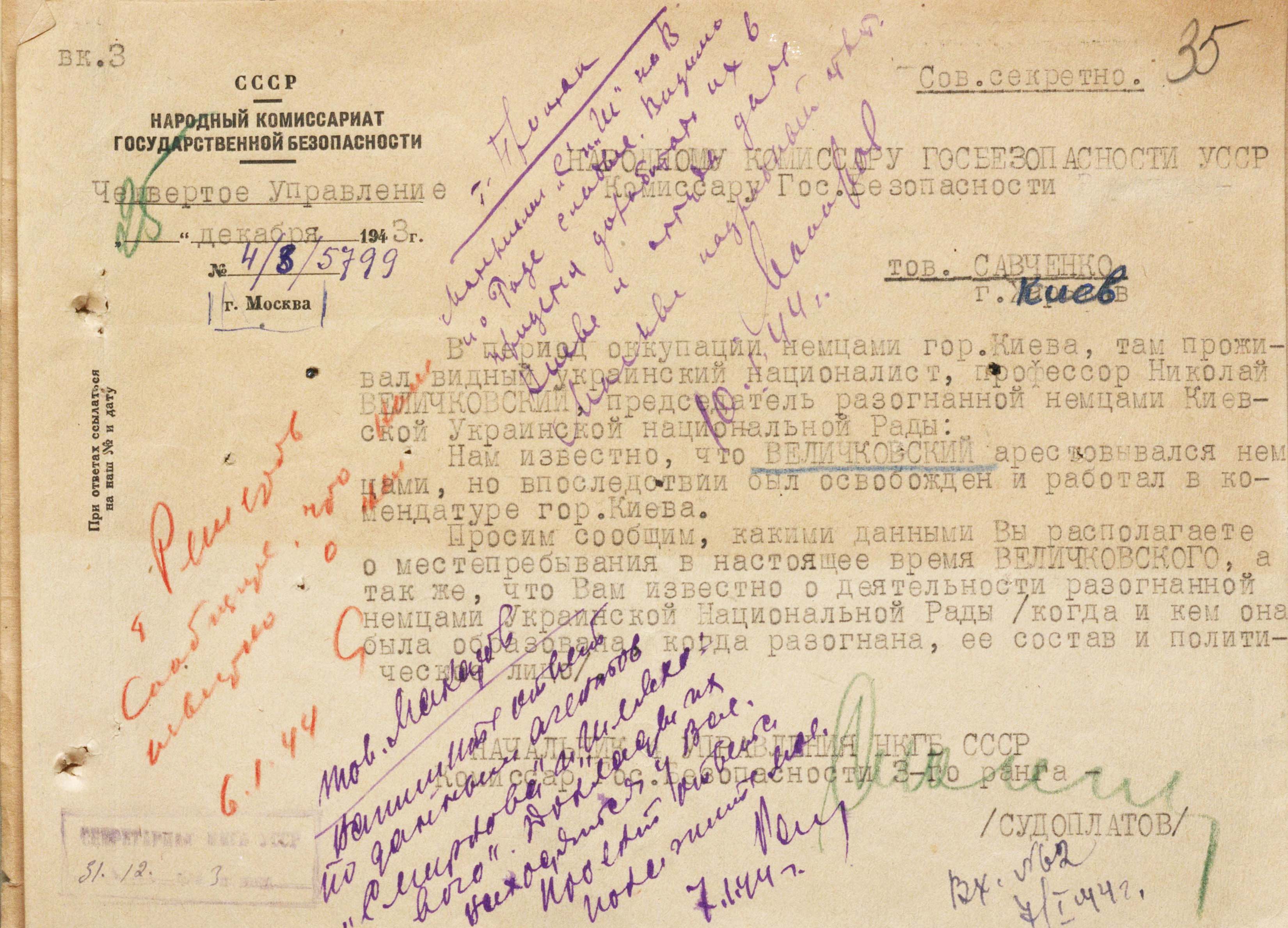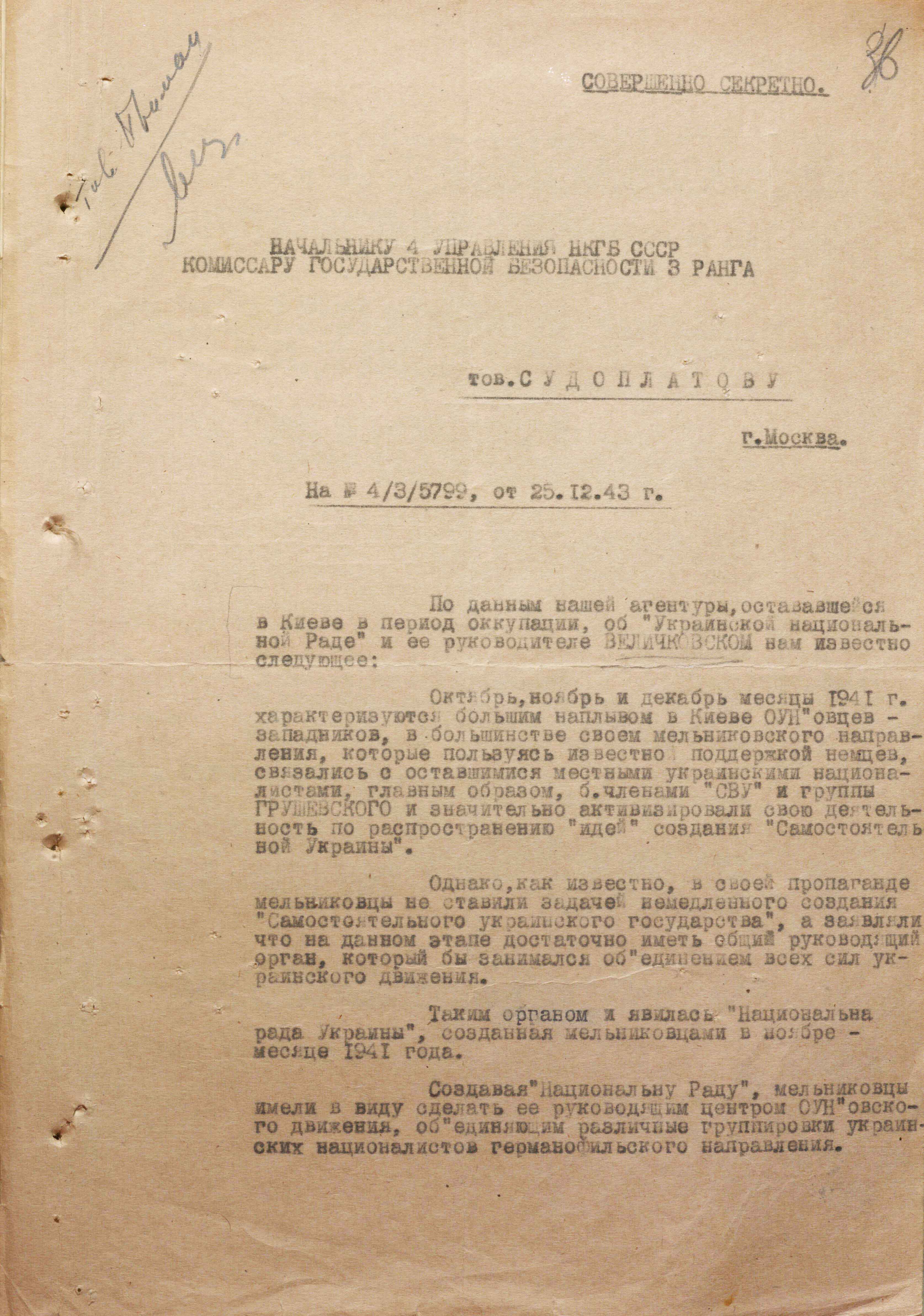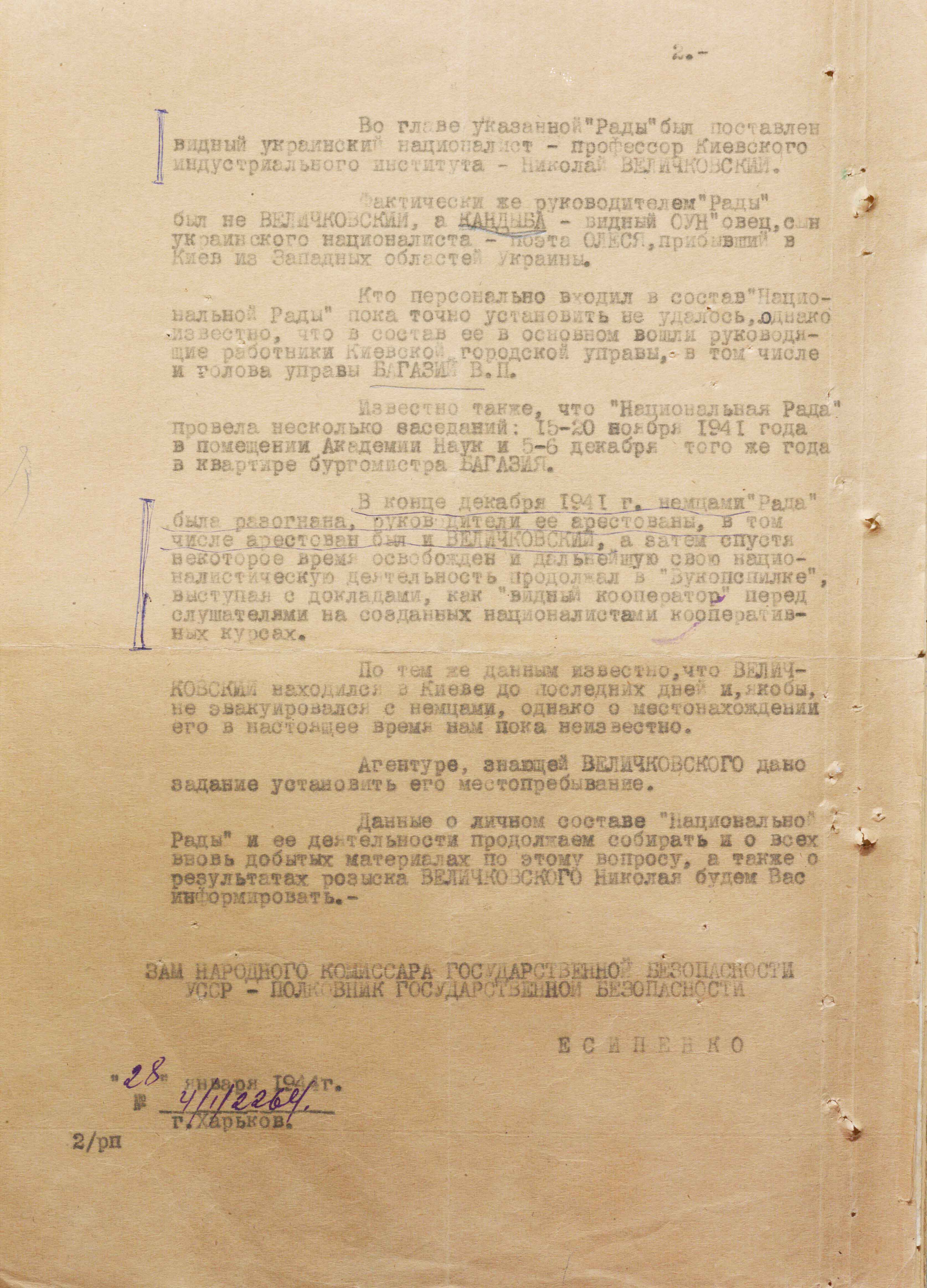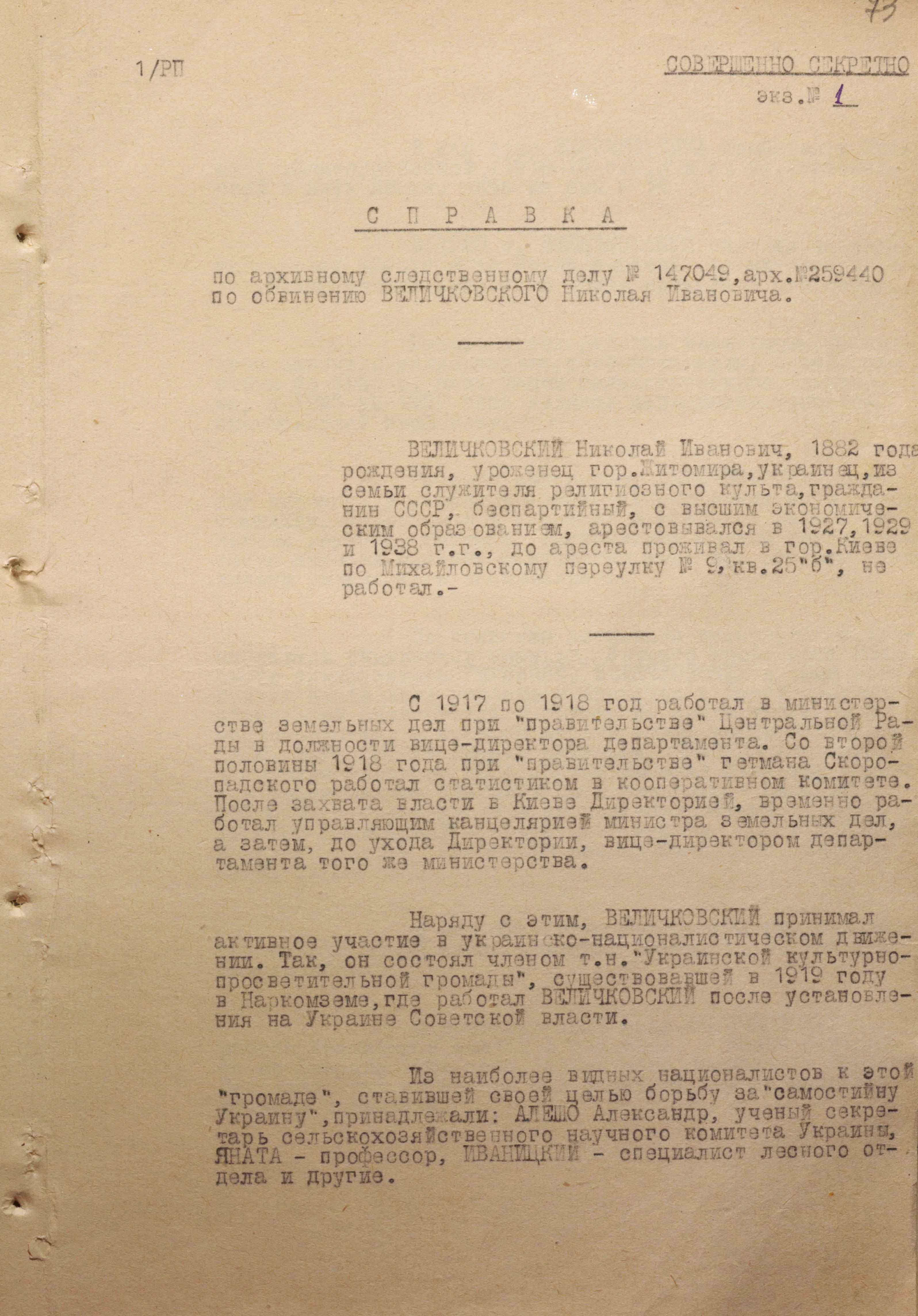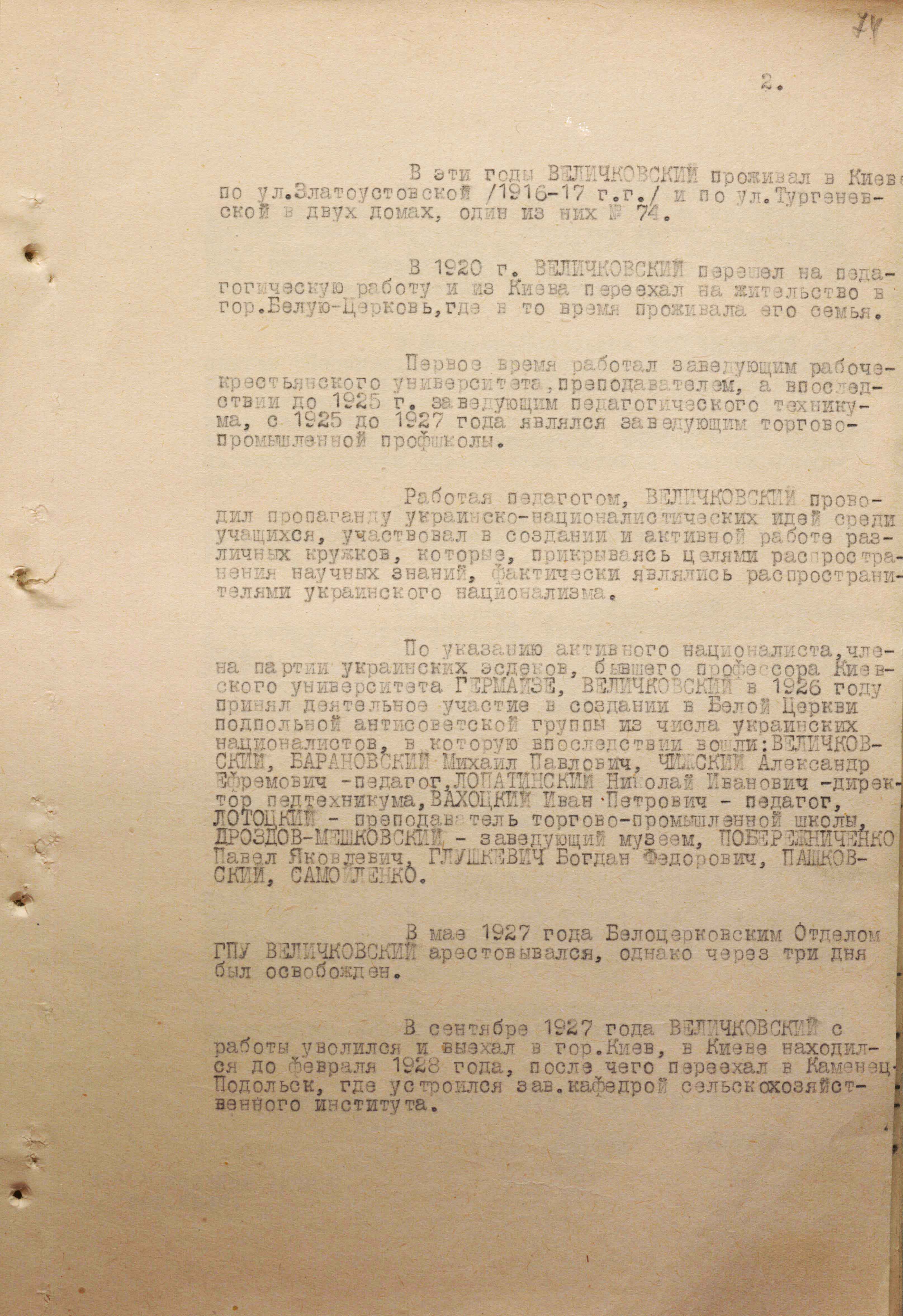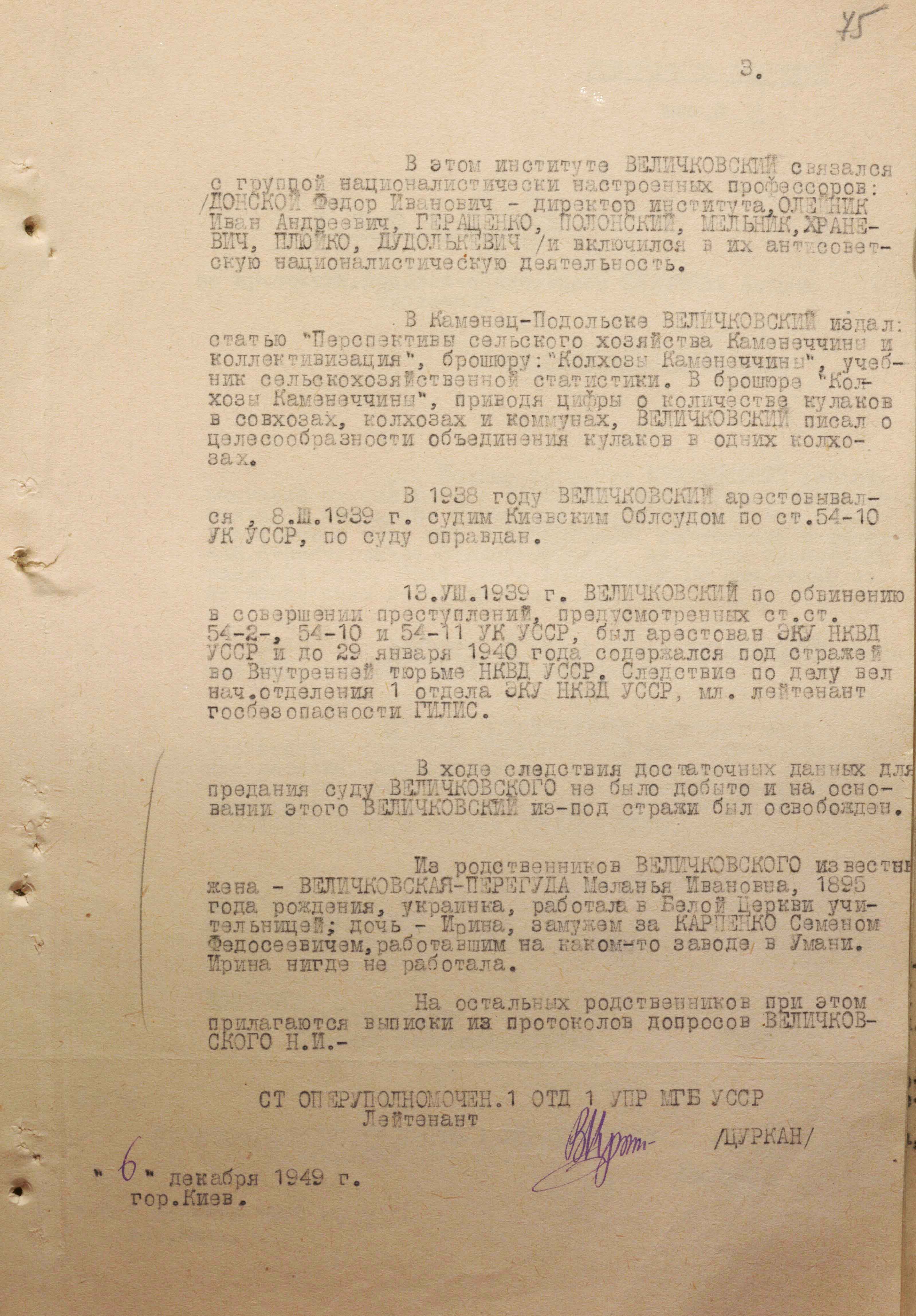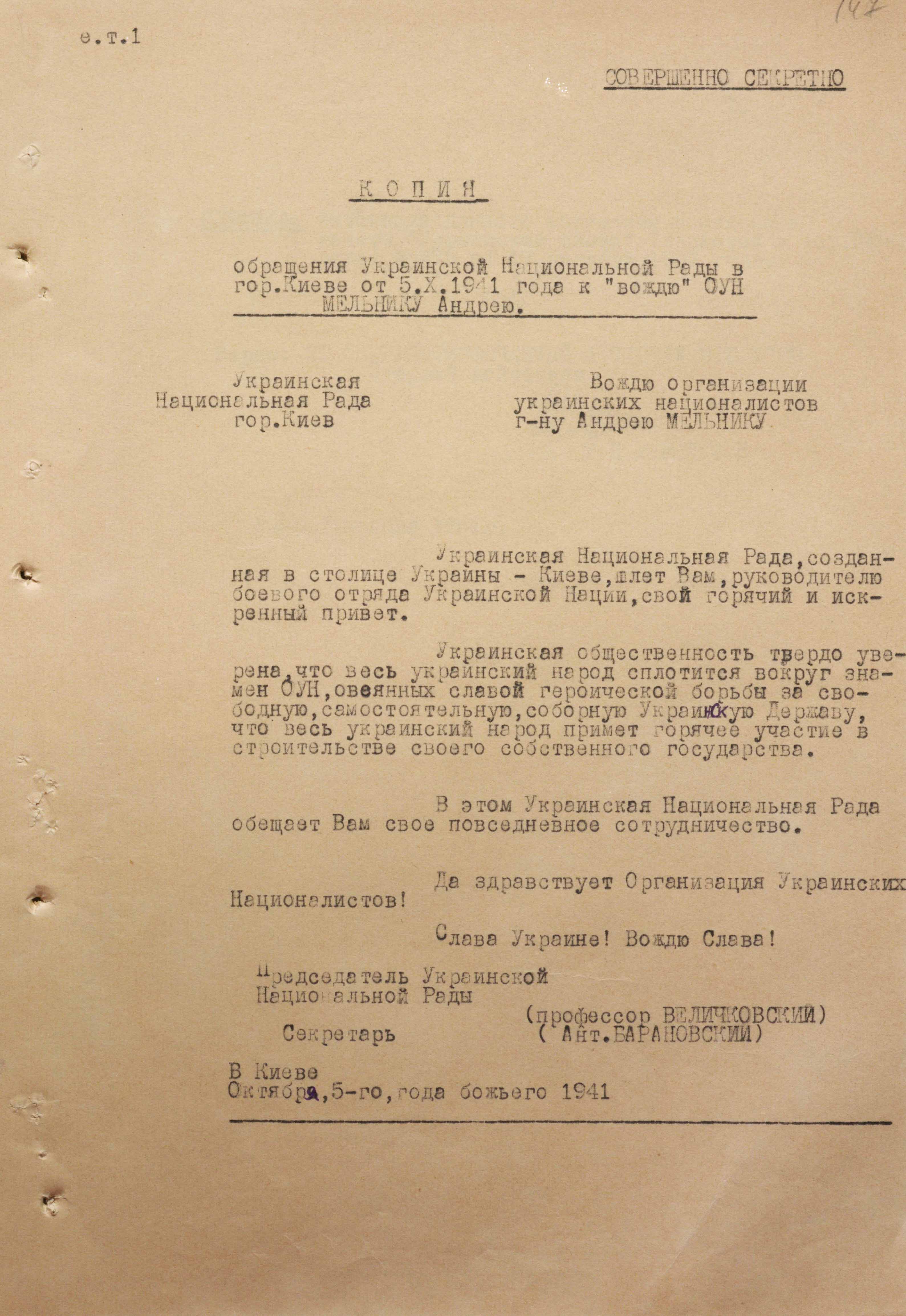Mykola Velychkivskyi. Between the nkvd and the gestapo
1/11/2025
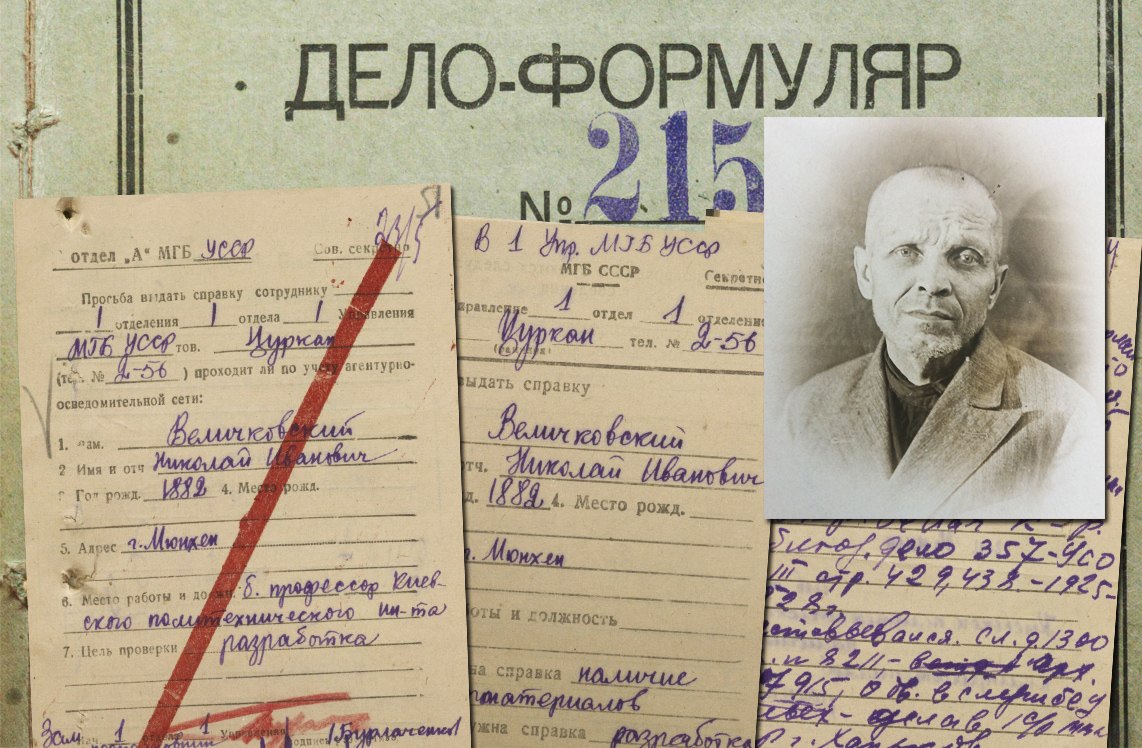
On January 11, 1889, Ukrainian political and public figure, scientist, Professor, Head of the Ukrainian National Rada (Council- Transl.) in Kyiv (1941) Mykola Velychkivskyi was born. It was his heading the UNRada that became reason for the nkvd’s opening a case, conducting operational investigation and preparing plans for compromising him. This is shown by declassified documents from the archive of the Foreign Intelligence Service of Ukraine.
“Top secret
To People's Commissar of State Security of the Ukrainian ssr
Comrade Savchenko
Kyiv
During the German occupation of Kyiv, Professor Mykola Velychkivskyi, a prominent Ukrainian nationalist, the Head of the Kyiv Ukrainian National Rada, which was dispersed by the Germans, lived there.
We know that Velychkivskyi was arrested by the Germans, but was soon released and worked in the commandant's office of Kyiv.
Please let us know what information you have about Velychkivskyi’s current whereabouts, as well as what you know about the activities of the Ukrainian National Rada dispersed by the Germans (when and by whom it was created, when it was dispersed, its composition and political face).
Chief of the 4th Directorate of the nkvd of the ussr Sudoplatov”
(FISU – F. 1. – Case 10369. – P. 35).
This document is dated December 25, 1943. As soon as Kyiv was liberated, the nkvd immediately began to find out what various Ukrainian organizations, parties, societies had been doing in the occupied territory. They searched for and arrested active figures and subjected them to repression for anti-soviet nationalist activities. So it was not accidentally that M. Velychkivskyi was included in such a list.
The reply to moscow said that October, November and December of 1941 were characterized by a large influx of OUN members (mostly from the Melnyk wing) to Kyiv. They grouped with local Ukrainian nationalists, former members of the mythical Union for the Liberation of Ukraine, supporters of Mykhailo Hrushevskyi and “significantly intensified their activities to spread the ideas of creating an independent Ukraine”. To implement their plans, they decided to create a general governing body that would unite all the forces of the Ukrainian movement. Such a body became the Ukrainian National Rada headed by M. Velychkivskyi.
The actual leader of the UNRada, as stated in the document, “was not M. Velychkivskyi, but Kandyba – a prominent member of the OUN, the son of the Ukrainian nationalist poet Oles, who came to Kyiv from western regions of Ukraine”. It was reported that the UNRada held several meetings and was disbanded by the Germans, and its leaders, including M. Velychkivskyi, were arrested, but soon released and continued their nationalist work in other positions.
Soon the mgb of the Ukrainian ssr opened a separate case against O. Kandyba – Oleh Olzhych, which shows how he was searched for and even at the end of the war, was planned to be assassinated. M. Velychkivskyi’s case file was gradually filled with new information about his life, work, and political views. They also found investigative files on him for the years 1920–1930. The summary report compiled on the basis of those materials, says that he was born in 1882 in Zhytomyr in the family of a clergyman. In 1917–1918, he worked in the Ministry of Land Affairs under the Central Rada as a deputy director of one of the departments. Under Hetman Pavlo Skoropadskyi he was in the cooperative committee. During the UPR Directory, he again returned to the Ministry of Land Affairs.
“At the same time, – reads a document of the mgb of the Ukrainian ssr, – Velychkivskyi was taking an active part in the Ukrainian nationalist movement. In particular, he was a member of the so-called “Ukrainian Cultural and Educational Community”, which existed in the Narkomzem... In 1920 Velychkivskyi switched to teaching and moved from Kyiv to live in Bila Tserkva, where his family was then. While working as a teacher, Velychkivskyi promoted Ukrainian-nationalist ideas among students... In 1926, he took an active part in the creation of an underground anti-soviet group of Ukrainian nationalists in Bila Tserkva...” (FISU- F.1. - Case 10369. - P. 73–74).
For such activities, in May 1927 he was arrested by the gpu department of Bila Tserkva, but released three days later. The paper states the following about further arrests and charges: “In 1938, Velychkivskyi was arrested again. On March 8, 1939, a hearing was held in the Kyiv Regional Court under Art. 54-10 of the Criminal Code of the Ukrainian ssr, acquitted by the court... August 13m 1939. Velychkivskyi, on charges of committing crimes under Articles 54-2, 54-10, 54-11 of the Criminal Code of the Ukrainian ssr, was arrested by the economy department of the nkvd of the Ukrainian ssr and was imprisoned until January 29, 1940 in the internal prison of the nkvd of the Ukrainian ssr... The invasigation did not find enough evidence to convict Velychkivskyi, so, based on this, he was released from custody” (FISU. – F.1. – Case 10369. – P. 75).
Special checks on records of a possible stay in the agentura apparatus of the gpu/nkvd did not yield positive results. Therefore, those who dealt with the case in 1943 and prepared the answer to P. Sudoplatov to moscow, saw for themselves that earlier M. Velychkivskyi had not been recruited. They could not sentence him to a long term of imprisonment, because they did not collect sufficient evidence for that.
Therefore, the chekists focused on collecting materials about the activities of the UN Rada in occupied Kyiv. At this, emphasis was placed on finding the information which would reflect its work mostly in a negative light. Therefore, in the documents, the UNRada was described as anti-soviet and such that closely cooperated with German occupying authorities and supported them in everything. In reality, the UNRada had a different goal and task. It was created on October 5, 1941 at the initiative of the OUN (Melnyk wing), by analogy and with a structure similar to the Central Rada of the times of the Ukrainian People's Republic. This had to symbolize the continuity of statehood traditions. It was headed by Presidium. And Mykola Velychkivskyi was elected Chairman as a non-partisan person who suited all parties.
One of the papers recounts the brochure “OUN in War,” published by the Provid of Ukrainian Nationalists abroad, in terms of the creation of the Rada. It states that the UNRada was composed of leading Ukrainian figures – representatives of Kyiv, Dnipropetrovsk, Zhytomyr, Poltava, Kremenchuk, Mykolaiv, Vinnytsia, Uman, Rivne, Kamianets-Podilskyi, Chernihiv, Lviv, Bukovyna, Kuban, and Carpathian Ukraine – who lived and worked in Ukraine at the time.
Among the archival documents there is the UNRada’s appeal addressed to Head of the Provid of Ukrainian Nationalists Andriy Melnyk, dated October 5, 1941. It was a kind of greeting on the occasion of its creation. It expressed confidence that the Ukrainian people would unite around the idea of fighting for a free, independent, united Ukrainian State and take part in building their own state. But this in no way correlated with the Nazis' plans.
“The occupying authorities initially proposed”, reads the paper, “to transform the Ukrainian National Rada into the Ukrainian Public Committee, and after this proposal was rejected, German authorities, by their order of November 17, 1941, banned the UNRada, and it went underground” (FISU - F. 1. – Case 10369. - P. 63).
During the Nazi occupation from the end of 1941 to the beginning of 1942, M. Velychkivskyi was the Rector of the Kyiv Polytechnic Institute, which, however, did not actually work. At the same time, he worked as the Director of the Institute of Economics, Statistics and Geography at the Ukrainian Academy of Sciences in Kyiv. Agents’ reports have been preserved about Velychkivskyi’s rectorship at the KPI. They say that circa November 1941, M. Velychkivskyi was introduced to the team “as a Professor and an ardent Ukrainian, and they were told that he was appointed Director of the Polytechnic Institute”.
But the organization of the Institute was delayed, as noted in the message, and the Germans did not give permission for student enrollment. Therefore, the teachers divided into production groups and started making candles, baking soda and installing electrical appliances. When the Germans found out, they allegedly came to the Institute and took away the products that were giving the employees at least some income for existence. In the same agent’s report, it is pointed out that M. Velychkivskyi was arrested by the Gestapo in March (according to other information – in January or February) 1942.
He was under arrest for a short time. Archival documents do not mention the charges against him and the circumstances of his dismissal. They only report that “after his release, he continued his nationalist activities at “Vukoopspilka”, where he lectured at short-term courses and called for the struggle for an independent Ukraine”. It is mentioned that at the end of the war, he headed the renewed UNRada in Lviv and acted together with Pavlo Shandruk.
After that, the chekists lost track of him. And only in May 1949, the mgb of the Ukrainian ssr drew up a resolution that M. Velychkivskyi lived in Munich, was a member of the Central Provid of the OUN-Melnikites and was subject to active agent cultivation. At the same time, his brother and sisters, who lived in the soviet union, were taken into cultivation. But all this failed to get at least some operationally significant information. So soon, in 1955, the case was closed and transferred to the archive.
Five years later, the chekists came across M. Velychkivskyi’s pamphlet “Our Affairs”. From it they learned that he lived in the USA and was allegedly the Director of the University of Ukrainian Studies at the Taras Shevchenko Scientific Society (NTSh). They also received information that he often spoke at various conferences, meetings and in the press with “anti-soviet slanderous articles about economic life in the Ukrainian ssr”. One of the documents gives the titles of such articles, in particular: “Where is the Best Place?”, “Will the empire Catch Up with America in Seven Years?”, “The Cost of moscow-Communist Propaganda”, “Destruction of Agricultural Scientists in Kamianets-Podilskyi” and others.
According to open sources, at that time M. Velychkivskyi was engaged in the active intellectual life of the NTSh and the Ukrainian Free Academy of Sciences, and did not abandon economic research. At the 1961 World Congress of Ukrainian Science in New York, he delivered an interesting speech “The soviet Experiment with Agrocities”. Soon afterward, he published a book on the destruction of agriculture by the soviet government. Besides, at different times he edited the magazines “Ukrainskyi Hospodarnyk” and “Ukrainskyi Kvartalnyk” in the United States, and sought to bring different factions of the Ukrainian liberation movement closer together.
“Since Velychkivskyi hides behind the image of a scientist”, the kgb pointed out in a paper dated December 30, 1965, “a certain part of the Ukrainian emigrants takes his anti-soviet studies of the situation in the ussr at face value. In this regard, it is advisable to debunk the true nature of Velychkivskyi as a traitor to the Ukrainian people and to compromise him in the eyes of the emigration and the American authorities. To this end, an article can be prepared and published in the newspaper “Visti z Ukrayiny”…”(FISU. - F. 1. – Case 10369. – P. 192).
In September 1966, at the suggestion of the kgb, such an article appeared in a newspaper. It was entitled “Strangers to Their People”. Among other things, it referred to M. Velychkivskyi as a traitor, who sided with America, and an agent. The text even criticized him for allegedly profiting from the sale of baking soda and candles while being the Rector of the KPI during the war, although the case file shows something completely different. It was only with the restoration of Ukraine's independence in 1991 that his work in the Ukrainian field was recognized and honored.
